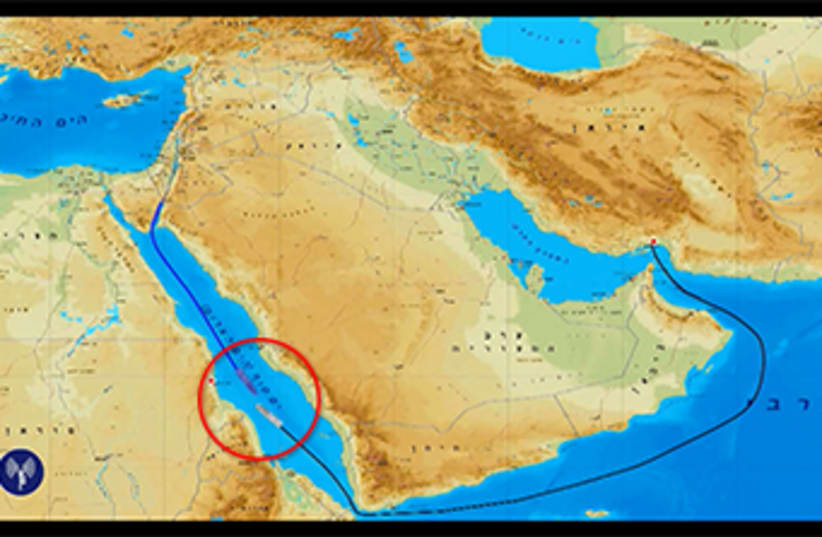The report constitutes a timely reminder that despite the recent charm offensive being conducted by the so-called 'moderate' Iranian President, Hassan Rouhani, the clerical regime in Tehran remains a brutal dictatorship solely dedicated to the pursuit of nuclear weapons, through which it seeks the elimination of the state of Israel and a more dominant role in Middle East affairs more broadly.
A video published by the Israel Defense Forces (IDF) indicates that Israeli intelligence had been tracking the shipment of advanced missiles since the rockets were initially loaded onto airplanes at the Damascus international airport. From there they were transported to Iran, and then to Iraq, and later boarded onto a Panamian-registered cargo vessel named the KLOS C, which set sail about ten days ago en route to a port in Sudan.
The shipment was allegedly headed to the Gaza Strip and contained, among other things, advanced M-302 missiles, which have a range of 200 kilometers and a payload of up to 170 kilograms, and are capable of blanketing Israeli population centers, all the way from Naharia in the North to Eilat in the South.
The incident is not the first time that a Hamas-bound Iranian arms shipment has been intercepted by Israel. In 2011, the Israeli Navy boarded the Victoria, a German-owned ship, which was laden with more than 50 tons of weapons that were concealed behind bales of cotton and sacks of lentils. According to the IDF Spokesman, most of the weapons were manufactured in Iran and contained Farsi-language instruction manuals printed with symbols of the Iranian Revolutionary Guards.
In 2009, the Israeli Navy intercepted a ship, called the Francop, off the coast of Cyprus, which was allegedly en route from Iran to Syria, at which point the weapons were to be offloaded and shipped by land to Iran’s terrorist proxy, Hezbollah, in Lebanon. IDF inspectors showed the ship contained 36 civilian containers with 500 tons of arms.
Iranian leaders have explicitly stated that the elimination of Israel is their goal. The IDF report indicating the existence of what amounts to be an Iranian weapons pipeline is further proof that, while Iranian leaders smile for the cameras and embrace American and European diplomats in public, they silently export rockets and fund terrorist groups in private.
Both Americans and Israelis rightfully perceive a nuclear-armed Iran as the greatest threat to security in the world. More specifically, recent polling demonstrates that an overwhelming majority of the American people want the United States Congress to vet the results of comprehensive negotiations (69%-25%), and want pressure kept up on Iran.
According to David Albright, the former United Nations International Atomic Energy Agency inspector and founder and president of the Institute for Science and International Security, to reach a comprehensive deal – such that Iran will not be able to develop, build, or acquire a nuclear weapon – Tehran must minimally remove 15,000 centrifuges, shut down its uranium enriching underground military bunker at Fordow, downgrade the reactor at its plutonium-production facility at Arak, and agree to a 20-year inspection regime. Iran would also have to export its entire stockpile of enriched uranium, which today is enough to produce approximately six bombs.
A good deal would force Iran to comply fully with IAEA demands and six mandatory UN Security Council Resolutions – which demand Iran suspend all enrichment, reprocessing, and heavy water activity. Parchin would be put under international scrutiny, and although there is no evidence of hidden enrichment facilities, tough consideration would be given to the likely existence of still-undisclosed sites.
In his address on Tuesday at the AIPAC Policy Conference, Prime Minister Binyamin Netanyahu drew a moral line between “life and death, between right and wrong, between the blessings of a brilliant future and the curses of a dark past.”
Only by forcefully emphasizing to Iranian leaders the need to choose, unequivocally, between moral right and moral wrong – and consequently, between a very bright and very bleak future – American lawmakers can compel the regime to abandon its quest to pursue nuclear weapons and end its support for terrorism.
Joseph Raskas served in the Israel Defense Forces. He is currently completing a graduate program at The George Washington University's Graduate School of Political Management.
